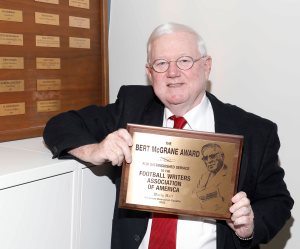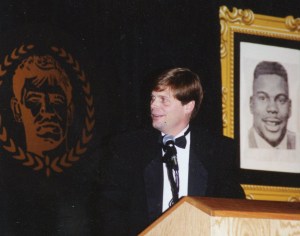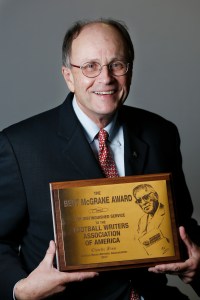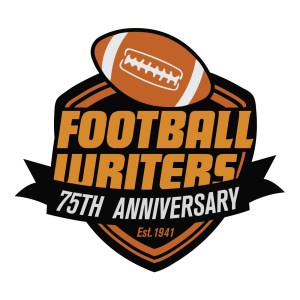INDIANAPOLIS — Veteran sportswriter Dennis Dodd of CBS Sports has been named the recipient of the FWAA’s Bert McGrane Award for 2022, symbolic of the association’s Hall of Fame. He will be honored during the Past Presidents Dinner here tonight.
“To paraphrase the great Bobby Bowden upon his retirement,” said Dodd, who was previously a co-FWAA Beat Writer of the Year recipient, “there is only one more big event in your life after you win the Bert McGrane.
“Seriously, I am humbled to join such an accomplished and legendary group. I truly don’t consider myself worthy. The FWAA has been at the core of my professional life. The FWAA’s values and principles have formed the foundation of college sports writing. Its members consider journalism a vocation, not just a job.”
The Bert McGrane Award, since 1974, has been bestowed on a FWAA member in recognition of contributions to the association and to college football and recognized in the College Football Hall of Fame in Atlanta. Dodd was named the Steve Ellis co- FWAA Beat Writer of the Year in 2018 and was also FWAA President in 2006.
“These last 18 months or so have been an inspiration,” Dodd continued. “Some of the best writing in any discipline has come from FWAA members during the pandemic. The virus presented a lot of us with unique challenges. We, as a group, rose to the occasion to frame COVID and its impact on the sport. To be part of this great fraternity remains an honor of a lifetime.”
A rundown of Dodd’s career …
PERSONAL: Married. Wife Janet. Two children — Haley, 29, and Jack 25. Haley is a graduate of Missouri, former Volney Meece scholarship recipient in 2009 and is working in Los Angeles in digital media. Jack is in business development in Kansas City. Dennis has won three first-place FWAA Best Writing Contest Awards. He is one of seven media members to cover all 16 BCS title games. Counting this year’ CFP championship game, that’s 22 of 24 championship games overall in the BCS era (since 1998). He has written two books, one on the history of Missouri basketball and the other on the formation of the Big 12. He calls his wife, Janet, “the absolute light of my life, guidance counselor, travel companion, life coach, cancer survivor and best friend.” One of his hobbies, NCAA Football on the PlayStation, was taken away from him by litigation. That and Jack took the Xbox to college. His passions are Happy Hour, hockey and Friday nights before Saturday games in college towns dining with media friends. “There’s no better fellowship,” he says.
MENTORS: Kansas City Star co-workers Tom Shatel and Steve Richardson, early on. Richardson, Dodd says, “mentored him when he came to Kanas City in 1981.” Shatel: “I wish I could be him as a writer and a father.” They can all still be seen in San Diego in somebody’s picture of that little joint by the sea. Dodd started going to America’s Finest City 38 years ago to watch the 1983 Holiday Bowl. In his last college game, Steve Young caught the game-winning touchdown. Shatel was along for the ride. Ivan Maisel, a “literary and personal hero.” I also want to thank Vahe Gregorian, Andy Bagnato, Chuck Culpepper, David Jones, Todd Jones, Dick Weiss, Mark Blaudschun, Tony Barnhart, Chris Dufresne, Pat Forde and everyone who has pounded the keyboards at midnight with me.”
BEST STORIES: He is most proud of two — one was on Dave Redding. “I drove up to central Nebraska to see legendary strength coach Dave Redding,” Dodd said. “In a profession full of characters, rogues and heroes, he was all three. Red Man had been stricken with Parkinson’s. He lived in a house built on the banks of the Platte River by himself and his dad. His only companions were a couple of dogs and a houseful of memories. He showed me his Super Bowl ring he earned with the Packers.He went in depth on two brothers who made it big in Hollywood before both dying of HIV. He kept asking me if I wanted a drink. It was 2 p.m. It was clear he was lonely. I had to decline because I had to drive back to Lincoln. I’m really proud of honoring him by writing that story.”
“In 2001, I had the idea to drive out to Cottonwood Falls, Kansas, to find the Knute Rockne Memorial where the great coach’s plane had crashed in 1931,” Dodd said. “It was the 70th anniversary of the crash that killed Notre Dame’s legendary coach. Before the days of GPS or Siri, I drove 90 minutes to Emporia, got directions to Cottonwood Falls, and then got directions again to Bazaar, Kansas. That’s the closest spot on a map to the memorial which stands alone on a 1,500-acre plot of land in the Flint Hills.
“I met a gentle soul named Easter Heathman.” Dodd said. “As a 13-year old in 1931, he had seen the plane come out of the clouds and crash. He was one of the first upon the scene. He remembered seeing a body with the legs wrapped with bandages. Years later, Heathman figured that must have been Rockne because the coach had phlebitis. Over the years Easter became a caretaker for the memorial, taking anyone who wanted to see it, up to the site. The landowner had given him a combination to unlock the gate. I revisited the story on the 90th anniversary of the crash this past March. But I had to sneak onto the land which has new owners who prohibit trespassers, including reporters like me. The five-mile hike across the Kansas prairie was worth it to geta cell phone picture of the memorial for the story.”
BEST ADVICE: Came from Janet, of course: “Listen … listen to her, listen to your children, listen to your heart,” Dodd says. “Professionally, listen to your interview subjects. They are doing you a favor by talking to you. They have a story to tell. It’s up to you to communicate it clearly.” Also, “Read (your story) one more time before sending it.”— Several editors.
THE BIGGEST CHANGE IN THE PROFESSION: Dodd says: “The lack of intimacy. I don’t have to tell anyone in the FWAA how hard it is now to connect with subjects. Open locker rooms are few and far between. Interviews are now ‘media availability.’ A chat must fit into an available ‘window.’ I believe schools sometimes are doing a disservice to these kids. They come to college to grow as people and, sure, as athletes. For a lot of them this is going to be the time of their lives. I’ve said it many times, on the college beat we’re there to write something positive 80 to 90 percent of the time. Don’t make it so hard. I mourn the loss of access. Often the story that gets told is not THE story. COVID has obviously had an impact, but let’s hope we can get back to what we had.
“On the positive side, the best biggest change is the influx of women into our profession. There still aren’t enough, but they keep coming. That’s a good thing. Thank you, Stef Loh for being our 2018 FWAA President and Heather Dinich this year. I know there are moretalented leaders inthe pipeline. Kelly Whiteside was our first female FWAA President in 2002”.
BEST INTERVIEW: Jeff Sims. “He wasthe coach at Garden City Community College,” Dodd says. “When I visited a few years ago, this was before Last Chance U. Sims grew up in St. Louis and had a dad — a cop— who smoked marijuana in front of him. Sims once waited outside a prison to get a commitment from a player who was completing 3 1/2 years for armed robbery. There’s a book here somewhere about the desperation at the junior college level — for the players to get there, get good and get out. During my visit there, I sat across from a linebacker, Alex Figueroa, who’d been kicked out of a previous school for a violation of school policy. His teammate had body-slammed a high school security guard on camera. These are some of the kids Sims pursued to be on his team. It remains a fascinating interview. Coach and players made no excuses about why they were there in the southwest corner of Kansas — to get out as soon as possible.




























































